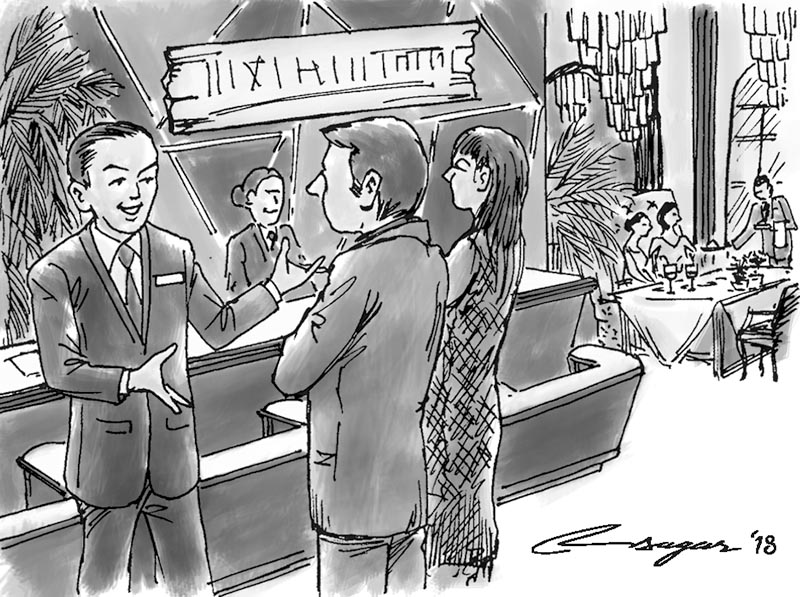Corporate culture: Hotels must embrace it
In hospitality business, while customers must get best of services, those who ensure these services — the staff within the organisation — also deserve a fair treatment. Only then can the industry sustain, operate and flourish
This may not be surprising to see the head of the department or managers at a five-star hotel abruptly stop reporting to work after serving in the company for years. I am putting more emphasis on “five-star” here, for it means luxury, comfort and security for the guests. But what about the comfort and security of people, including managers, working there on contractual basis?
It seems to be a common practice in star hotels here; a general manager may ask any of the managers abruptly not to report to work from the following day — reasons given for the diktat may vary.
The hotel industry in Nepal is considered the lowest paying industry for locals despite the fact it demands 10-12 hours of work every day round the year.
On April 25, 2015, a massive earthquake hit the country. But a contractual manger had to work that day and had to be on time the next morning, for there were in-house guests to be taken care of. Why am I giving this reference? This shows the dedication on the part of contractual managers as well as expectations from them.
Many a contractual manager often dread to hear that a new general manager is arriving. The worry stems from whether the new boss would like him/her or not. The meaning of “like” may not be related to work and performance only; it goes a bit far and may carry a wider definition.
I am a hotel management graduate with 18 years of experience in Nepal’s privately-run five-star hotels. I have held managerial positions for more than a decade and led one of the largest departments of a hotel making it Number One in Nepal in terms of revenue earning.
I have come across a situation in which one of the key department heads, who gave his 30 years to a 40-year-old hospitality facility to make the department Number One, left — or had to leave — suddenly.
One fine day he was called to the general manager’s office. The general manager, a foreigner, who had arrived only four months ago, told him that he was not happy with the food there at the hotel.
The department head put in his papers not to return to work from the next day. What one must not forget is 90 per cent of food items could have been not to the liking of the general manager, a foreigner who had arrived in Nepal only four months ago.
So the question arises: was there any corporate culture in the Rs 100-crore company?
Hotel industry is different from others in the sense it is up and running all the time — 24x7, seven days a week, round the year — without fail, even during curfew and strikes. Not to mention even in the immediate aftermath of the earthquake.
Those working in the hospitality industry have to work day and night. The gentleman I mentioned above — I had seen myself — was at work until 8pm the day the massive earthquake struck the country, and the next morning he was back to work at 7 just to ensure that everything was in place, that operation was smooth with the limited number of staff present that day. He used to live 20 kilometres from the hotel.
Hotel industry in Nepal has gone through several ups and downs. The Nepali management staff have worked very hard to save this industry. With tourism expected to flourish and more tourists expected to arrive here, we believe the industry will see further growth. But where we are lagging behind is we have not been able to bring corporate culture in the industry.
Corporate culture is rooted in an organisation’s goal, strategies, structure and approach to employees, customers and community. Corporate culture refers to the beliefs and behaviours that determine how a company’s employees and management interact and handle outside business transactions. One of the major aspects of corporate culture is employee benefits. But sadly this part seems to have been overlooked in Nepal’s hotel industry.
In hospitality business, while customers must get the best of services, those who ensure these services — the staff within the organisation — also deserve a fair treatment. Only then can an industry sustain, ensure smooth operations and flourish.
Corporate culture develops slowly over time and a company creates a niche by its culture that is reflected in various aspects — staff, dress code, discipline, office set-up, treatment of clients, client satisfaction, etc.
If you are keen observer, you must have noticed some of the renowned hotels have same furniture, same set-up and even same set of cutlery for ages. I had encountered a guest who told me the plates used during his granddaughter’s rice-feeding ceremony were similar to what he had seen 20 years ago when he had hosted his daughter’s wedding party.
This is just an example.
What I am trying to say is the industry must learn to adapt to the changes, it must change with time.
Success of any company depends on the cumulative efforts its human resource puts in. In hospitality business, where humans directly deal with customers — face-to-face on most of the occasions — staff play a crucial role in writing the success story of the company. While clients are given the utmost preference in this industry, the staff, who stand as the pillars during good and bad times, must also be taken good care of. For this, hotels must embrace corporate culture.
The sooner the better.






